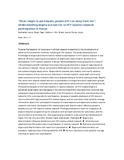| dc.contributor.author | Nybladed, Laura | |
| dc.contributor.author | Singh, Sagri | |
| dc.contributor.author | Ashburn, Kim | |
| dc.contributor.author | Brady, Laura | |
| dc.contributor.author | Olenja, Joyce | |
| dc.date.accessioned | 2013-06-28T06:31:51Z | |
| dc.date.available | 2013-06-28T06:31:51Z | |
| dc.date.issued | 2011-11 | |
| dc.identifier.citation | Vaccine | en |
| dc.identifier.uri | http://www.sciencedirect.com/science/article/pii/S0264410X11014745 | |
| dc.identifier.uri | http://erepository.uonbi.ac.ke:8080/xmlui/handle/123456789/41408 | |
| dc.description.abstract | Purpose
Participation of volunteers in clinical research is essential to the development of effective HIV prevention methods, including an HIV vaccine. This study expands current knowledge of stigma and discrimination related to participation in HIV vaccine research in sub-Saharan Africa by exploring the perception of stigma and discrimination as a barrier to participation in HIV vaccine research in Kenya.
Methods
Eighteen focus groups with a total of 133 participants and 82 individual interviews were conducted with a range of respondents at two centers in Nairobi, Kenya: a preventive AIDS vaccine trial center; and a preparatory clinical and epidemiological study center. Respondents included peer leaders, community advisory board members, former and current volunteers in clinical research, study staff, community leaders and community members. Data were analyzed using an iterative coding process.
Results
Four prominent stigma-related barriers to participation emerged among all respondent groups, across both centers: (1) volunteers are often assumed by family and community members to be HIV positive because of their participation in vaccine research; (2) HIV-related stigma is perceived as pervasive and damaging in the communities where volunteers live, thus they fear consequent stigma if people believe them to be HIV positive; (3) potential volunteers fear being tested for HIV, a prerequisite for participation, because of possible disclosure of HIV status in communities with high perceived HIV-related stigma; and (4) volunteers must carefully manage information about their participation because of misperceptions and assumptions about vaccine research volunteers.
Conclusions
HIV-related stigma and discrimination influence people's decisions to join HIV-vaccine related research. Findings underscore a need for integration of stigma-reduction programming into education and outreach activities for volunteers, and the communities in which they live. This is particularly critical for trials recruiting individuals with higher HIV risk, who are often already highly stigmatized.
Highlights
► Stigma and discrimination influence decisions to join HIV-vaccine related research. ► Volunteers are assumed to be HIV positive due to participation in vaccine research. ► Potential volunteers fear stigma and discrimination will result from participation. ► Stigma and discrimination are prevalent, leading to fear of being tested for HIV. ► Current volunteers must carefully manage information about their participation | en |
| dc.language.iso | en | en |
| dc.relation.ispartofseries | Volume 29, Issue 48, 8 November 2011, Pages 8924–8928; | |
| dc.subject | Clinical trials | en |
| dc.subject | HIV vaccines | en |
| dc.subject | Stigma and discrimination | en |
| dc.subject | Negative social impact | en |
| dc.subject | Kenya | en |
| dc.title | “Once I begin to participate, people will run away from me”: Understanding stigma as a barrier to HIV vaccine research participation in Kenya | en |
| local.publisher | Department of Community Health, University of Nairobi | en |
| local.publisher | Research Triangle Institute International | en |
| local.publisher | International AIDS Vaccine Initiative | en |
| local.publisher | International Center for Research on Women, Washington | en |

